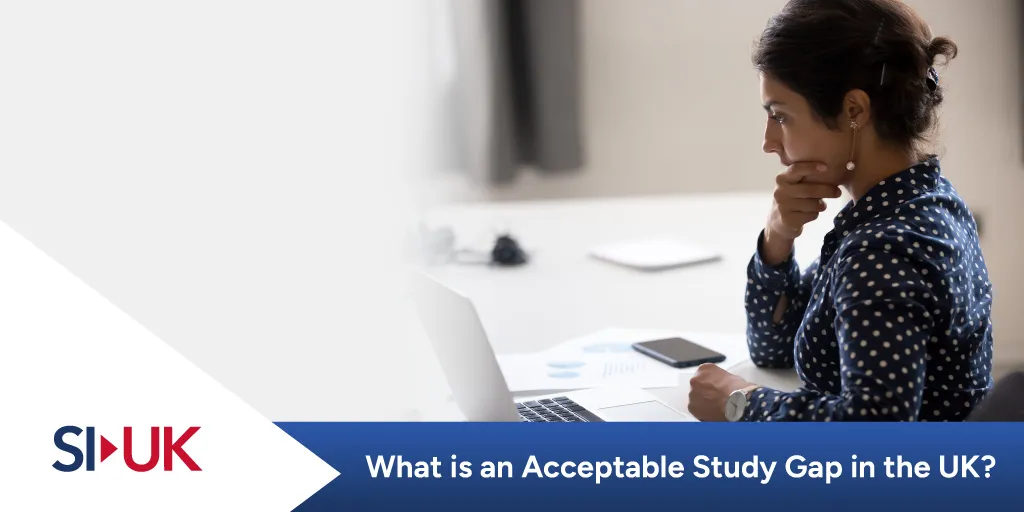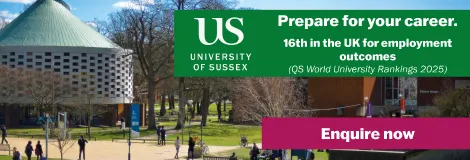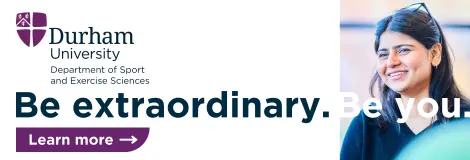When pursuing a master’s degree, students may take study gaps for a variety of reasons, and a productive study gap can be valuable on their CVs and improve their first-hand knowledge of the subject matter. That’s why UK universities are understanding of study gaps, which is great news if you’ve already taken a break from your studies to obtain some work experience or fulfil personal obligations. However, framing your study gap the right way in your university application is important for your university to understand how you benefited from it.
We’ve explained how to bridge your study gap when applying for a UK Master’s in this blog, along with providing a list of universities which accept study gaps. Let’s start by understanding what a study gap means.

What’s a study gap?
A study gap is a break between your previous educational qualification and the one you’re planning on doing next. For instance, many students opt to gain some practical experience after an undergraduate degree and before they start their Master’s. You may have taken a study gap for various reasons, including work experience, career prospects, and personal commitments, and UK universities will inquire about your activities during your study gap.
Since most UK universities will inquire about your study gap at the time of your application, you must provide proof of these experiences when you resume your education after a long break.
What’s the impact of a study gap?
Taking a study gap may help you in a number of ways, for example, during your gap you may start working and gain hands-on work experience which would aid you in a postgraduate degree. In this way, study gaps usually offer an opportunity for you to gain skills and experiences which will help you reflect on what you want to do next for your studies. Most importantly, these qualifications and skills can help you stand out when applying for a Master’s at competitive UK universities.
While shorter study gaps are often seen as a positive by UK universities, especially if you have done professional or volunteer work related to your studies during that period, a very long study gap may need some explanation when filling out your applications. We’ve covered the general rules of study gaps and what to keep in mind when applying to the UK with one in the next few sections.
How many study gap years are acceptable in the UK?
The number of gap years acceptable in the UK depends on two factors: the university you’re applying for and whether you’re applying for an undergraduate or postgraduate degree. Most UK universities accept a two-year study gap if you’re an undergraduate student and a five-year study gap if you’re a postgraduate student. Let’s take a look at some universities which accept a study gap longer than two years for undergraduate degrees next.
The acceptable study gap for undergraduates in the UK
Although UK universities generally accept two gap years after you have finished your Class 12 exams and before you start your undergraduate degree, some accept a longer study gap. However, to be accepted into an undergraduate programme at such a UK university, you’ll likely need to fulfil certain other conditions. We’ve outlined a few here:
| UK universities accepting study gaps which are longer than two years for undergraduates | |
|---|---|
| University | Other conditions to fulfil |
|
Bangor University considers the relevant professional experience of two years or longer for admission into their undergraduate degrees. |
Prospective students must provide:
|
|
Cardiff Metropolitan University Cardiff Metropolitan considers extenuating circumstances – personal and medical – which may have significantly affected a prospective student during a certain period in time. |
Prospective students must provide:
|
|
University College Birmingham (UCB) UCB accepts applications from students with work or life experiences. |
Prospective students must provide:
|
Similar to undergraduate programmes, if you are applying for a Master’s programme in the UK with a study gap, you must keep a few key details in mind which we’ve explained in the next section.
The acceptable study gap for postgraduates in the UK
The study gap generally accepted by UK universities when applying for your Master’s is a five-year one. These shorter study gaps are especially seen as a positive by UK universities as they look for well-rounded Master’s applicants with experiences that show evidence of:
- Interest in the chosen programme
- Academic skills for the programme
- Transferable skills
We’ve provided a comprehensive list of UK universities that accept a study gap of five years at the end of this blog, but if you’re a student with a study gap longer than five years, this table will help you out:
| UK universities accepting study gaps which are longer than five years for postgraduates | |
|---|---|
| University | Other conditions to fulfil |
|
Coventry University accepts students from backgrounds other than that of academics. It also allows for mitigating circumstances which may have caused disruption or disadvantage to a student beyond their control. |
Prospective students must provide:
|
|
Students with a lengthy study gap must satisfy the university of their ‘genuineness’. |
Prospective students must provide:
|
|
Kingston University considers applicants on an individual basis where work or other experiences are taken into account. |
Prospective students must provide:
|
Now that you’ve understood the general rules when it comes to study gaps in the UK, let’s next take a look at how you can explain your study gap to UK universities.
How to cover the study gap when applying to the UK?
Many UK universities that accept study gaps expect students to provide valid reasons for taking a break from their studies, which means your application will be stronger if you show how you’ve used your study gap productively to either grow professionally or personally. We’ve outlined some of the reasons why students choose to go for study gaps below.
Work experience or internships
UK universities welcome students who have both full-time and part-time work experience as students often opt to work between educational qualifications to support themselves or to gain valuable career insights.
Competitive exams or short courses
You may acquire skills by taking vocational courses or government exams during your study gap. You’ll have to show the university how these courses align with your plans, but that doesn’t mean they have to strictly be in your chosen field. For instance, you can use your study gap to learn a new language because you plan on employment which involves a lot of travel with a Master’s in International Business.
Health issues
Sudden health issues can sometimes be unavoidable and UK universities understand this. You’ll have to show the university your motivation to continue your studies and how you can contribute to their student body.
Family issues
Similar to health issues, UK universities understand that family issues can lead to unavoidable circumstances. You must be prepared to also explain these circumstances to the immigration authorities when you’re applying for your UK study visa.
Each student’s circumstances and goals are different which is why UK universities accept a variety of reasons for study gaps. When you apply for a UK study visa evidence of your activities during your study gap will come in handy as UK immigration authorities assess whether you’re a ‘genuine’ student.
How to bridge the study gap for a UK study visa
The UK’s visa office is understanding of study gaps, however, you must provide documentary evidence of your activities during the study gap to prove to them that you’re a genuine student. This is why it’s important to share your reasons for taking a study gap and provide solid evidence of your activities during it when applying for your visa. Let’s begin by understanding how your visa application will be judged by the authorities.
UK Student visa’s point-based system and what it means if you have a study gap
The points-based visa system in the UK allows you to score points on various aspects of your application to be accepted as an international student to the UK. This system also allows students to apply for a UK Student visa without having to explicitly give reasons for a study gap. While it’s not mandatory, providing documents that show what you were doing during your study gap will help your application appeal to authorities with more confidence.
Documents required to explain your study gap
The documents you submit with your visa application play a crucial role in determining whether you’re eligible for a UK Student visa when you apply with a study gap. The documents you can show to explain your study gap include:
- Work experience letter
- Short course/government exam certificate
- Medical certificates
- Death certificates/marriage certificates/birth certificates or other legal documents which show family circumstances and difficulties
- Statement of Purpose (SOP)
Your visa application will not be complete without these mandatory documents too:
- A current passport
- Documents of financial evidence
- ATAS certificate (if required)
- Proof of guardian consent (if applicable)
- Proof of your relationship to your guardian (if applicable)
- Your TB certificate
- Written consent from your financial sponsor (if applicable)
- Documents about your dependants (if applicable)
Provide the best SOP stating your goals and determination
Your SOP can be used to explain the reason behind your study gap to your university and the experiences you gained from it. When providing your explanation, keep these three pointers in mind:
- Be transparent about your reasons for taking a study gap, what you did during it, and how it impacted your life.
- Showcase how your study gap benefited you and how that would in turn benefit your Master’s.
- Align the experiences you gained during your study gap with your future goals in your chosen Master’s programme.
Choosing the right university for your Master’s after taking a study gap requires careful consideration, so we’ve helped you get started on your research by providing a comprehensive list of UK universities that accept study gaps in the next section.
Top UK universities that accept students with study gaps for a Master’s degree
When selecting a UK university for your Master’s, you’ll likely consider a number of factors, such as its ranking, the courses it offers, its academic standing, student support, and employability after graduation. That’s why we’ve provided this list of UK universities that accept students with a five-year study gap for a Master’s degree along with key aspects of each university so you can make an informed decision.
Leeds Beckett University
Leeds Beckett University places a strong focus on employability after graduation, so all courses include at least two weeks of work-related learning per year.
University of Aberdeen
University of Aberdeen graduates enjoy some of the highest starting salaries in Scotland.
University of Lincoln
The University of Lincoln is listed in the world’s top 135 universities in the Times Higher Education’s Young University Rankings 2024.
University of Oxford
Oxford University graduates are highly sought after, and five years after graduation, the average salary for Oxford alumni stands at nearly £43,000, placing them among the highest earners in the UK.
Brunel University London
Brunel University is ranked 38th in the UK (QS World University Rankings 2025) with over 100 taught master's degrees, enabling students to become an expert in their chosen field.
University of Warwick
The Times and Sunday Times Good University Guide 2024 ranks Warwick 9th in the list of the UK’s top universities, and in 2022, the university was announced as University of the Year Runner-Up.
Cranfield University
Cranfield University is an exclusively postgraduate university, focusing on aerospace, defence and security, energy and power, environment and agrifood, manufacturing, transport systems, and water.
Imperial College London
Imperial College London is part of the prestigious Russell Group and is ranked the 6th best university in the UK by the latest Times Good University Guide.
University of Edinburgh
The University of Edinburgh is amongst the world's largest and most prestigious universities, and Edinburgh is currently ranked in the global top 30 in the QS World University Rankings 2025.
University of Leeds
The University of Leeds courses offer many placement and internship opportunities to help students become more employable upon graduation.
King’s College London
King’s College London is ranked in the top 10 UK universities in the world (QS World University Rankings 2025) and has 14 Nobel Prize laureates among its alumni and current and former faculty.
University of Manchester
91% of Manchester University’s recent graduates enter employment or continue studies.
Queen Mary, University of London
Queen Mary is ranked in the top 20 institutions in the world for international outlook, and through its recruitment agency, QTemps, students can find placements on or local to campus during or after their degree.
University of Nottingham
The University of Nottingham is the third most targeted UK university when it comes to top employers (2024 High Fliers report) and has ranked in the top five for three years running.
University of Glasgow
The University of Glasgow has one of the broadest research bases in the UK, with a wide range of disciplines reflected in the academic community.
Researching the wide variety of universities and Master’s programmes in the UK is the best way to restart your academic journey after a study gap and find a school that meets your needs. If you need some extra help, check out our next section on how we provide support for students with a study gap.
How can SI-UK help you to study in the UK with a study gap?
Your study gap should not be a reason that holds you back from pursuing your dreams in the UK, as UK universities accept students from diverse backgrounds with wide-ranging interests and experiences. However, if you have a longer study gap, you may have to meet certain other entry requirements like providing a detailed CV with your application. We can help you check your eligibility and frame your study gap positively in your application.
Check your eligibility
If you want help with understanding the best possible way to present your study gap in your application to UK universities, arrange a free consultation with our experts today. We can help you check your study gap eligibility and finetune your applications for you.
FAQs
What is the maximum gap acceptable for a UK study visa?
In the UK, a maximum two-year gap is accepted for undergraduate studies and a maximum five-year break is accepted for postgraduate programmes. However, some UK universities will accept longer study gaps, provided that you meet certain other entry requirements.
Does a gap year affect UK visas?
No, as the points-based visa system in the UK allows you to score points on various aspects of your application, you can apply for a UK Student visa without having to explicitly give reasons for a study gap. While it’s usually not mandatory, giving documents that show what you were doing during your study gap will provide authorities with that added layer of confidence in your application.
How many years of gap is acceptable in the UK after 12th?
UK universities usually accept a two-year study gap after you have finished your Class 12 (CBSE) exams and before you begin your undergraduate degree. Some universities like Bangor University, Cardiff Metropolitan University, and University College Birmingham accept longer study gaps, provided that you fulfil certain other conditions in your application.
What are the documents that need to be submitted during the study gap?
The documents you can show to explain your study gap include work experience letters, short course/government exam certificates, medical certificates, death certificates/marriage certificates/birth certificates or other legal documents which show family circumstances and difficulties, and a good Statement of Purpose (SOP).
Can I study in the UK after 13 years of study gap?
While postgraduate programmes in the UK generally only accept a five-year study gap, providing evidence of your skills acquired during a longer study gap will aid in your application.







 I sincerely thank SI-UK for getting me accepted to UCL. The MSc in Urban Development and Planning is extremely competitive, but the right guidance provided by SI-UK made my dream of studying at University College London a reality. The services were exceptional from beginning to end.
I sincerely thank SI-UK for getting me accepted to UCL. The MSc in Urban Development and Planning is extremely competitive, but the right guidance provided by SI-UK made my dream of studying at University College London a reality. The services were exceptional from beginning to end. 

